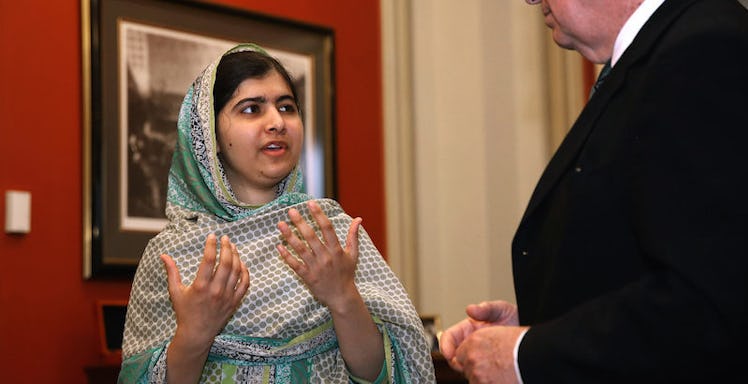
4 Ways Malala Yousafzai's Life Is A Victory Over Terrorism
Malala Yousafzai just became the youngest person in history to win the Nobel Peace Prize.
She's only 17 years old, but as an educational activist and feminist icon, she's already accomplished more than most people can hope to in an entire lifetime. Accordingly, it is difficult to think of a more deserving individual for this prize.
Yousafzai has displayed an indefatigable passion for peace, equality and education.
Her tireless advocacy has inspired people around the world to stand up for human rights and egalitarian principles.
The Little Girl Who Stood Up To Terrorists
Malala is from the Swat Valley of Pakistan. In 2009, the Taliban was very active in this region, terrorizing residents and shutting down schools that educated girls.
At that point in time, Yousafzai was 11 years old and wanted to become a doctor. Thus, she became an outspoken critic of the Taliban's efforts to prevent girls from receiving an education.
She blogged about her experiences living under the Taliban for the BBC. As a result, the public took notice of this amazing Pakistani schoolgirl's story.
This brave young woman defiantly stood up in the face of tyranny and oppression, and showed the world the true meaning of courage.
Malala went on to fight for women's educational rights throughout Pakistan. Consequently, in 2012, the Taliban attacked a school bus that she was on. They singled her out because she was encouraging other girls to go to school.
When the Taliban gunman boarded the bus, he asked, "Who is Malala?" She bravely and unashamedly replied, "I am Malala."
Malala was shot in the face, but she survived and went on to become an international sensation and symbol of equality and perseverance. Hence, Yousafzai not only survived a terrorist attack, she has continued to stand up for the very causes that led the Taliban to target her.
Yousafzai is fearless, and every single one of her accomplishments is a victory over terrorism.
Correspondingly, in the words of Ban Ki-moon, the secretary general of the United Nations:
With her courage and determination, Malala has shown what terrorists fear most: a girl with a book.
Her contributions to the world have been immeasurable, but here are a few examples of her benevolent activities:
1. She started the Malala Fund, which supports educational rights for the world's children.
The Malala Fund was founded by Ms. Yousafzai to empower girls through education. It gives young girls a voice, advocates for equality and invests in community-centered educational projects.
At the moment, there are 66 million girls out of school around the world. Every three seconds, a girl will become a child bride, and 80 percent of human-trafficking victims are young females. Obviously, there is still much that needs to be done and the fight is far from over.
Still, the Malala Fund is a palpable example of this remarkable young women's vigorous efforts to make our world even just a little bit better.
2. The United Nations declared July 12 "Malala Day."
July 12 is Malala's birthday. Naturally, the United Nations declared it Malala Day, in honor of her life and message.
Last year, she gave a speech to the UN on the first official Malala Day, when she poignantly stated:
Malala Day is not my day. Today is the day of every woman, every boy and every girl who have raised their voice for their rights. Let us pick up our books and pens. They are our most powerful weapons. One child, one teacher, one pen and one book can change the world. Education is the only solution. Education First.
3. More than 3 million people have signed the Malala Petition, which inspired the UN and Pakistan to commit to children's education.
The Malala Petition calls on the United Nations to recommit to Millenium Development Goal 2. This goal aims to provide children everywhere with the opportunity to complete a full course of primary schooling by 2015, regardless of gender.
Malala was the first to sign the petition, and over 3 million people have joined her. This inspired Pakistan to pass a Right to Education bill.
4. The Taliban was so afraid of her, they tried to assasinate her. But she survived. They failed, she won.
Knowledge is power. Terrorists and other oppressive forces want people to remain ignorant for this very reason. This is why the Nazis burned books, why the Soviets censored the media and why the Taliban tries to prevent females from going to school.
Standing up to oppression takes tremendous courage, it can get you killed. Malala is proof of that. This is precisely why people like her are so important. They strike fear into the hearts of terrorists because they refuse to be afraid.
Terrorism can be defined as using physical and psychological intimidation for political and social purposes. When someone like Malala stands up and says, "No, I will not be afraid. You will not control my destiny," it takes away all of their power. As Ms. Yousafzai once stated:
On the night of 9 October 2012, the Taliban shot me on the left side of my forehead. They shot my friends, too. They thought the bullet would silence us, but they failed.
Malala Yousafzai is an example for us all. She has taught us that we are the masters of our fates, and that an education is a fundamental human right worth dying for.
Photo Credit: WENN